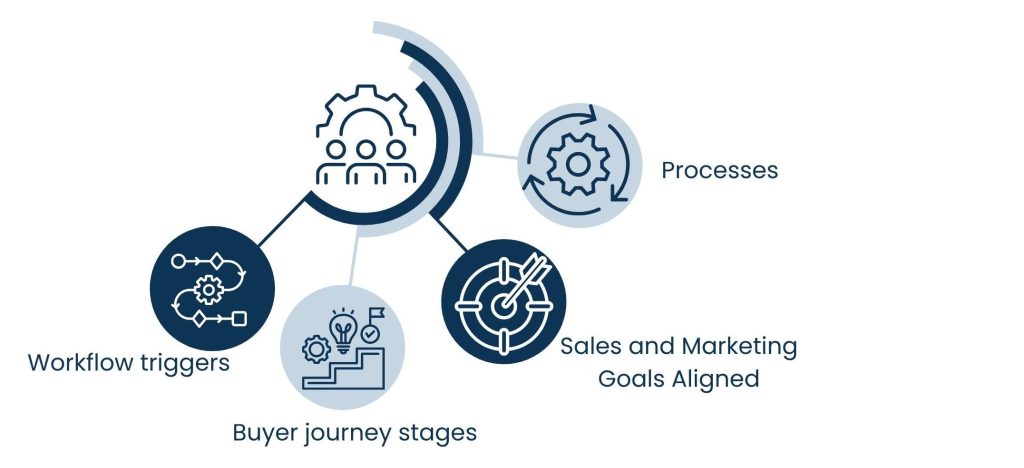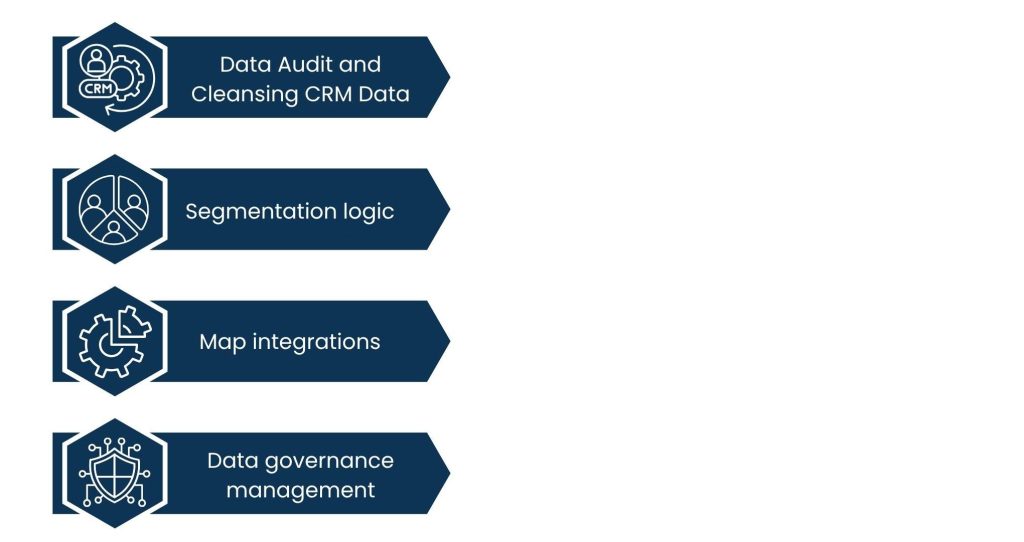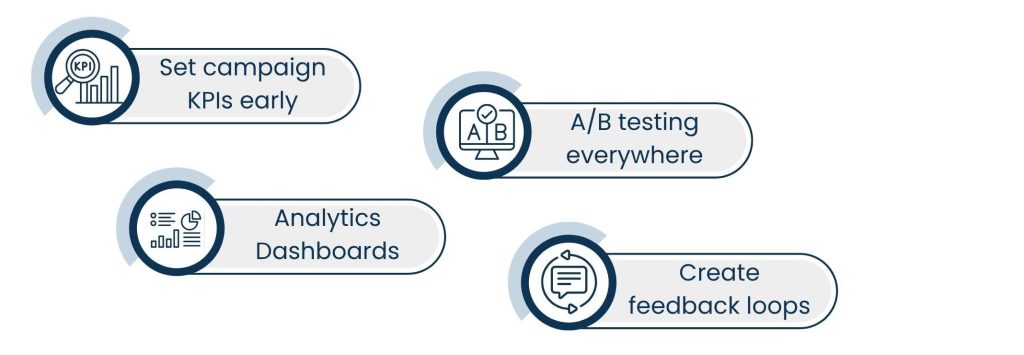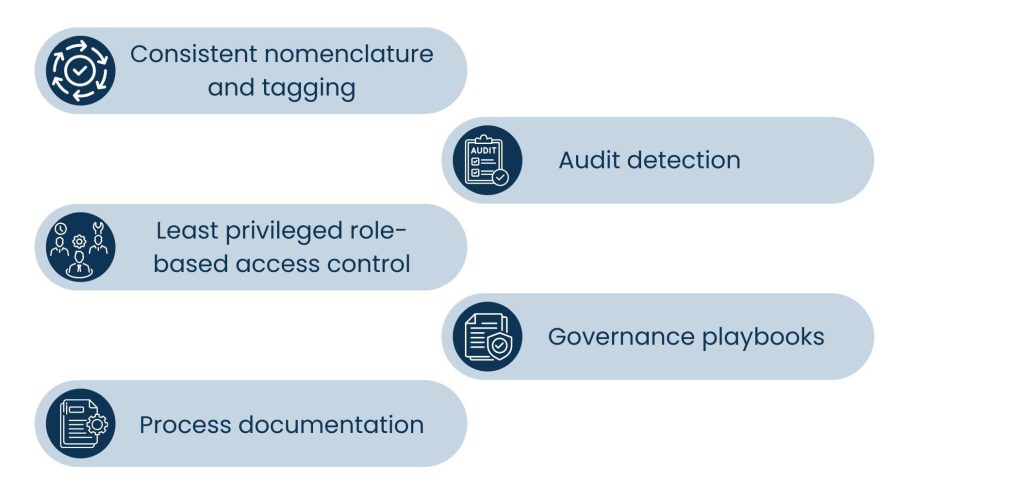Introduction
Marketing Operations Services form the foundation of an efficient automation workflow. But before you can automate anything, emails, lead routing, or the triggers behind campaigns, you need structure: precise processes, data that is dependable, and teams that are in sync. Without that, automation is just an easy way to proliferate errors rather than enhance productivity.
Marketing automation is not just about the tools. It’s ensuring that those tools are hooked into a strong operational foundation. That’s where marketing operations support comes in. It standardizes workflows, cleaning up CRM data, and making sure all systems connect to each other properly.
Good operations in marketing don’t just help to automate; they make the automation smarter. From more accurate data to clear reporting, it allows for the growth of your business without the chaos. Which is why the smartest automation strategy starts with one thing: solid, well-run Marketing Operations Services. Absent that, automation is nothing more than speed without a bearing.
Marketing Operations Services to Get More Done in Less Time
Before developing an automated marketing workflow, you need direction. Who is running the campaign? What is an MQL? When is a lead ready for sales? Without clear answers to these questions, automation can quickly lead to chaos and inefficiency.
A specialized marketing ops team constructs the framework for automation. They don’t just dive in with tools; they start with process mapping and standardization. Each action, each handoff, each condition is spelled out in advance so there’s no confusion in translation.

Marketing Operations Services can simplify your structure by:
1. Processes:
Specific actions of how pros care for campaigns, leads, and data.
2. Sales and Marketing Goals Aligned:
You must have your sales and marketing working in concert, including team settings in lead definitions, conversion points, and reporting metrics.
3. Buyer journey stages:
Establishing definitive criteria for when prospects are ready to move from one stage to the next, so each email, touchpoint, and offer is matched to where the customer is.
4. Workflow triggers:
Outlining specific events that trigger workflows, like filling out a form, opening an email, or changing stages in the deal.
This work forges the path to move your team out of reactive marketing and onto a path of strategic execution. It reduces ambiguity and enables automation to be based on processes that make sense and are acceptable to everyone.
If, for example, marketing defines a lead differently than sales does, automation will backfire, and marketing will wind up pushing leads over to sales too early or, in some cases, way too late. Without well-defined lifecycle stages, contacts might receive messaging at the wrong time, or they could slip through the cracks. But these problems aren’t tool problems, they’re structural problems, and they’re solved with solid marketing operations support.
In addition, structured marketing ops offer documentation and playbooks that simplify onboarding, training and campaign planning. When a new member of the team comes on board or they start up a new campaign, if every accepts the same process, teams should not have to reinvent the wheel.
Ultimately, marketing and operations need to collaborate to develop processes that are not just fast—but resonate and scale. You can’t automate your way out of an unstable base. With accurate Marketing Operations Services, you’re not just increasing the velocity of your campaigns; you’re also improving clarity, consistency, and confidence.
Automation Needs Clean, Centralized Data
Even the most sophisticated automation workflows do nothing if they’re running on unclean, inconsistent data. When Automated Marketing Goes Bad – Why default data quality is now a key issue. One of the leading causes of underperforming or failed Automated Marketing campaigns. That’s why good automation doesn’t start with emails or triggers; it starts with a way to manage clean, well-structured data managed through robust Marketing Operations Services.
When contact records are duplicated and lifecycle stages are not defined, and CRM fields are absent, automation tools don’t know how to take appropriate action. Many things can happen, from leads receiving the wrong emails to routing mistakes to leads falling through the cracks. These are not tech problems, they’re data hygiene problems that need a real expert eye; from a marketing ops team.

Marketing Operations Services prepares data for automation by:
- Data Audit and Cleansing CRM Data: Deduplication, Data Standardization & Updating of Missing Entries.
- Segmentation logic: Segment and group leads based on a certain behavior, demographic, or lifecycle stage to drive personalized workflows.
- Map integrations: So tools like CRMs, marketing platforms, analytics systems align with each other, reverse engineer back to a source of truth.
- Data governance management: Establishing and enforcing rules for how to gather data and update across systems.
This clean, centralized data makes it simpler to tailor your campaigns, build trustworthy dashboards, and act based on the insights gathered. It ensures no annoying mistakes like those infamous “first name fallback” emails or sending repeat communications to the recipient.
For example, on a disorganized CRM, automation may send onboarding emails to an existing customer or refer a new lead to a sales rep who has already closed the deal. Clean data does just that, because you do not want to hinder your marketing automation; you want to use it.
With powerful marketing professionals working behind you, you can process accurate and updated information in real time. It will help you target your ideal audience better, and improve engagement, conversion and customer retention.
In other words, automation feeds only on good data. And good data doesn’t just mysteriously appear; it’s the product of a strategic, marketing ops approach. And with the right Marketing Operations Services, your automation isn’t guessing; it’s getting the job right every time. That’s the distinction between campaigns that fall flat and concepts that fuel genuine business growth.
Improved Marketing and Operations Collaboration
Automation, it doesn’t sit in just one department; it’s cross-functional. Campaigns may be born from marketing, but they depend on input from sales, IT, analytics, and customer success. That’s why innovations in workflow automation don’t exactly proliferate in silos. It requires marketing and operations collaboration, clarity, and that’s where Marketing Operations Services have the most impact.
When teams aren’t in sync, automation goes south. It’s possible Sales doesn’t feel confident about marketing’s leads. Marketing doesn’t know the type of content sales need. IT can block integrations or slow down deployment. Such misalignments are what slows down or makes automation less efficient.
With robust marketing ops support, your teams get a single source of truth. Marketing ops pros are connectors, between strategy and execution, ensuring that everything, from the systems to the workflow to the metrics, matches up.

Below are just some examples of how Operations Services helps everyone in Marketing work together better:
- Shared docs: Building centralized process maps, campaign calendars, and report dashboards that everyone can access.
- Tools integrations: Professionals leverage systems like HubSpot or Marketo holistically.
- Cross-departmental processes: Developing automation rules that rely on information or a handoff from siloed teams like lead scoring, MQL routing, and renewal notifications.
- Real-time visibility: They offer campaign and pipeline dashboards, which means marketing and sales are looking at the same data and are on the same page without a hint of tension or misunderstanding.
Marketing ops are also very important in setting expectations. By defining roles and responsibilities, they help prevent redundant effort and dropped handoffs. For instance, marketing ops may stipulate when a lead turns qualified, when sales gets it, what sort of communication occurs at each stage.
This alignment results in better campaign execution, stronger, more responsive follow-up, and improved customer experience.
And, marketing operations is the link that connects creative strategy and technical reality. They ensure that what’s planned in meetings works in the system—on time and without errors.
Without this alignment, automation falls apart, tools don’t talk together, leads are lost, and reporting is inaccurate. However, with the right collaborative Marketing Operations Services, each process is designed to shoulder the process and people’s requirements.
Teams working together through great ops infrastructure, automation go from a bottleneck to a competitive advantage.
Campaign Optimization Starts with Measurement
Automation without measurement is like driving with eyes closed – you might get there really fast, but can have no clue if that is the right direction. This is why tracking performance is a must, not a nice-to-have. And this is also precisely why a successful automation also relies on marketing operations services that are data and analytics-driven and foster the continuous improvement model.
And teams build these automated workflows, and then they move on and assume they’re gonna keep delivering. But without careful tracking and testing, you won’t know whether any of it is working, whether it’s broken, or could be better. This is where marketing operations support comes into play: the evolution of automation from a static “set and forget” to a growth-focused engine.

Here’s how Marketing Operations Services can deliver smarter measurement and optimization:
- Set campaign KPIs early: All automation workflow must predefine goals in sight – be it MQL generation, email engagement, and the marketing ops teams.
- Analytics Dashboards: Your teams must be able to see open rates, form submissions, how sales are following up, and conversion paths in real-time; keeping them quick and nimble.
- A/B testing everywhere: Ops teams put testing frameworks in place to A/B email subject lines, timing, messaging, and sequences; they’re constantly iterating to figure out what works best.
- Create feedback loops: Marketing and sales are part of reporting loops so feedback is delivered to inform the enhancement of lead qualification and sales messaging.
If, for instance, your automated lead nurturing effort is seeing high open rates but low conversions, a marketing ops team will identify where the drop-off occurs, test alternative options, and make changes. Without that insight, you could be running agents that simply don’t work forever.
Marketing operations people also ensure that your data is actionable. They tag campaigns correctly, create tracking URLs, and segment reports by audience, channel, or campaign stage—so you get actionable insights, not just vanity metrics.
This system allows teams to know what they are doing, not just do something without strategy, they think would work, or go off a broken report. And in the longer term, this leads to higher ROI, more efficient campaigns, and optimal exploitation of your marketing budget.
The right Marketing Operations Services are a must, or the smoothest-running automations will still cap out. But with the proper measurement systems in place, every campaign becomes an opportunity to learn, optimize, and scale. Because in the world of automation, the bonus isn’t improvement, it’s the actual goal.
Governance is The Key to Scaling Automation
As companies grow, they add more marketing tools, build bigger teams, and create more automated workflows. This growth needs strong governance to stay efficient and organized. In the absence of control, this creates chaos. This is why scaling automation is only successful when built on a solid foundation of Marketing Operations Services to create the structure, consistency, and control necessary to use automation to its full potential.
The point of governance is not stifling creativity; it’s allowing it on a platform that blocks mistakes and duplication and errors. Multiple teams starting campaigns and editing workflows without a shared process guarantees that errors will happen. Leads might receive the same messages multiple times, be assigned to the wrong sales reps, or get lost entirely due to poorly set up triggers.

Marketing Operations Services define guardrails for automation to scale successfully, such as:
- Consistent nomenclature and tagging: Simplifying the way of finding, organizing, and reporting campaigns as your library grows.
- Least privileged role-based access control: Avoid making unwanted changes or overwriting with conflicting edits in the tooling your automation.
- Process documentation: Making sure all campaigns go through a standard build, QA, and launch process.
- Audit detection: Re-occurring scans to find auditing for inactive workflows, outdated triggers, and compliance gaps.
- Governance playbooks: Onboarding teammates in how to use systems, how to work with data, and how to use approved workflows.
And that’s critical not only for marketing organizations but for any business that requires marketing and operations to work together on systems that intersect with a variety of siloed business groups. Whether it is sales depending on lead scoring out of marketing automation or customer support plugging into on-boarding sequences – governance brings in a fresh approach to ensure congruence and responsibility.
Even the best of automation tools can become a problem without this structure. Disconnected systems, illogical overlap, conflicting logic, and confused users all work against your brand, annoy your leads, and muddy your reporting.
But with expert marketing operations backing, your automation even stays scalable and in alignment with your growth dreams. Governance ensures that what’s good for a five-person team is good when you have 50 or 500 people working together.
At the end of the day, automation isn’t just more automated, it’s doing it all the right way. And it’s with the organized control of Marketing Operations Services that you have the power to grow with certainty! And that is the bedrock of stable, successful automation.
Conclusion
It’s these Marketing Operations Services that make the difference, splitting a series of disparate tools from an automated, well-oiled, scalable engine. They deliver structure and clarity and data quality for every workflow and ensure that automation powers actual results, not just motion.
Automation built on a shaky foundation leads to problems: duplicate messaging, lost leads, messy reports.
But when you get good marketing operations support, everything hums. Whether it’s automating lead progression or encouraging collaboration across teams, strong alignment between marketing and operations ensures everything works efficiently.
The goal isn’t just to save time; it’s to build a system that grows with the business, delivering better accuracy and deeper insights. So before you blast off on your next automation pursuit, first think: is the foundation prepared? But if it is, your automation will not only kick into a higher gear: it will also kick into a smarter one.
About Us
Tasks Expert offers top-tier virtual assistant services from highly skilled professionals based in India. Our VAs handle a wide range of tasks, from part time personal assistant to specialized services like remote it support services, professional bookkeeping service etc. Furthermore, it helps businesses worldwide streamline operations and boost productivity.
Ready to elevate your business? Book a Call and let Tasks Expert take care of the rest.









